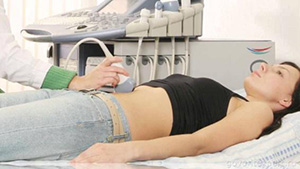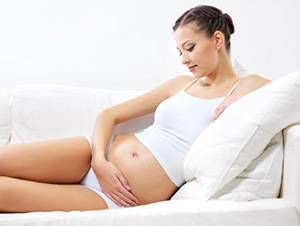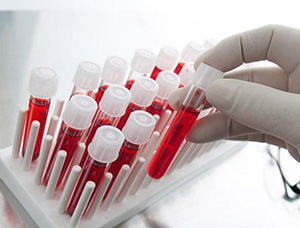In medical practice, the obstetric method of calculating the gestational period is used, according to which 5 weeks of pregnancy after IVF corresponds to 7 obstetric weeks. The starting point is the first day of the last menstrual period before conception. The embryonic period "lags" behind the obstetric period by two weeks, because it is counted from the moment of the onset of ovulation (the middle of the menstrual cycle).
Fifth week of embryonic development
The embryonic (true) gestational age is counted from the first day of the last menstrual period plus another two weeks. It is in the middle of the cycle that ovulation occurs, i.e. about the 14th day after the critical days. In other words, the 5th week of embryonic development corresponds to the 7th obstetric week.
 14 days after IVF, a hCG test is performed, with the help of which the fact of pregnancy is determined. In case of successful conception, women undergo the first ultrasound scan already at the 5th week of gestation. The survey allows you to determine:
14 days after IVF, a hCG test is performed, with the help of which the fact of pregnancy is determined. In case of successful conception, women undergo the first ultrasound scan already at the 5th week of gestation. The survey allows you to determine:
- The size of the uterus;
- Embryo location;
- The number of engrafted blastocysts;
- The presence or absence of pathologies in the development of the fetus.
It should be understood that embryologists determine the gestational age of a fetus differently from obstetricians. After IVF, specialists can accurately determine the day of conception, which is counted from the moment the blastocyst is implanted into the uterus.
In the mid-embryonic period, the fetus is located near the wall of the yolk sac, which, using ultrasound, is visualized as a small spherical cyst with a fetal egg inside. The embryo is located eccentrically inside the bag, which is why a typical ultrasound picture of a "double bubble" appears on the monitor.
At this stage of embryonic development, many organs and vital systems are already beginning to develop, but it is very difficult to visualize them using transabdominal ultrasound. That is why, to determine the characteristics of the course of pregnancy, specialists resort to transvaginal research, with the help of which it is possible to obtain a more detailed picture.
Features of the development of the embryo
 The 5th week of pregnancy corresponds to the beginning of the second obstetric month, i.e. from the moment of implantation of the ovum into the endometrium, it takes about 29-35 days. On an ultrasound photo, a 5-week-old embryo looks like a small cylinder 6-7 mm long. During this period of pregnancy, you can distinguish the rudiments of the arms and legs, as well as the auricles and nasal slits of the embryo.
The 5th week of pregnancy corresponds to the beginning of the second obstetric month, i.e. from the moment of implantation of the ovum into the endometrium, it takes about 29-35 days. On an ultrasound photo, a 5-week-old embryo looks like a small cylinder 6-7 mm long. During this period of pregnancy, you can distinguish the rudiments of the arms and legs, as well as the auricles and nasal slits of the embryo.
From the 5th week of gestation, the formation of the pancreas, upper respiratory tract and liver occurs. It is during this period that the child's heart makes its first beats, and the circulatory system continues its active development. In the last days of the fifth week of pregnancy, the rudiments of the bone marrow, the thyroid gland and certain elements of the musculoskeletal system are formed.
With the help of transvaginal ultrasound, it is possible to distinguish between the eye sockets and the places of development of the inner and outer ear. Due to the underdevelopment of soft tissues, it is impossible to determine the sex of the child in the early period of gestation. However, the pictures show the umbilical cord and individual elements of the endocrine system.
Feelings of a mother
For a period of 5 weeks after IVF, women feel objective changes in their bodies, which are caused by an increase in the level of hCG in the blood. The hormone is produced by the embryo to accelerate the development of the fetal site - the placenta. It also has a significant effect on the hormonal background of the mother and stimulates the secretion of female sex hormones.
 The signs of pregnancy after IVF do not differ from those with the natural conception of a child:
The signs of pregnancy after IVF do not differ from those with the natural conception of a child:
- nausea;
- lack of appetite;
- vomiting;
- enlargement of the mammary glands;
- darkening of the areola of the nipples;
- violation of the stool;
- toxicosis;
- change in taste;
- emotional lability;
- heaviness in the lower abdomen;
- increased basal temperature;
- increased urination.
The occurrence of additional symptoms (bleeding from the vagina, spastic pain in the uterus) is the basis for seeking help from a doctor.
Pregnancy management after IVF
 Adequate gestational support reduces the likelihood of miscarriage and abnormal fetal development. To prevent complications, it is advisable to be observed by specialists of the clinic where the IVF procedure was performed within 6-8 weeks after conception.
Adequate gestational support reduces the likelihood of miscarriage and abnormal fetal development. To prevent complications, it is advisable to be observed by specialists of the clinic where the IVF procedure was performed within 6-8 weeks after conception.
In the first trimester of pregnancy, patients should have regular blood tests to determine the level of:
- chorionic gonadotropin;
- estrogen;
- progesterone.
A low concentration of steroid hormones is the basis for corrective hormone therapy. It should be understood that an ordinary obstetrician-gynecologist in the antenatal clinic does not have sufficient experience in managing patients who have undergone IVF. If the risk of termination of pregnancy increases, the fertility specialist will recommend an additional examination or hospitalization.
Complications during pregnancy
Induced pregnancies are more likely to have complications than pregnancies resulting from natural conception. This is due to the presence of disorders in the reproductive system in patients, which became the reason for a married couple to turn to assisted reproductive technologies.
 According to statistics, gestation is interrupted in 90% of cases in the first three months after conception. The following factors affect the likelihood of complications:
According to statistics, gestation is interrupted in 90% of cases in the first three months after conception. The following factors affect the likelihood of complications:
- immune compatibility of partners;
- the woman's fertile age;
- fluctuations in hormonal levels;
- development or exacerbation of infectious diseases.
The most likely complications include the fading of pregnancy, which is more often diagnosed in patients after 40 years. In 83% of cases, the embryo stops its development for up to 11-12 weeks, which may be associated with a decrease in the level of estradiol or progesterone in the body. To prevent fetal death, many women in the first trimester of pregnancy after IVF are prescribed hormone maintenance therapy.
